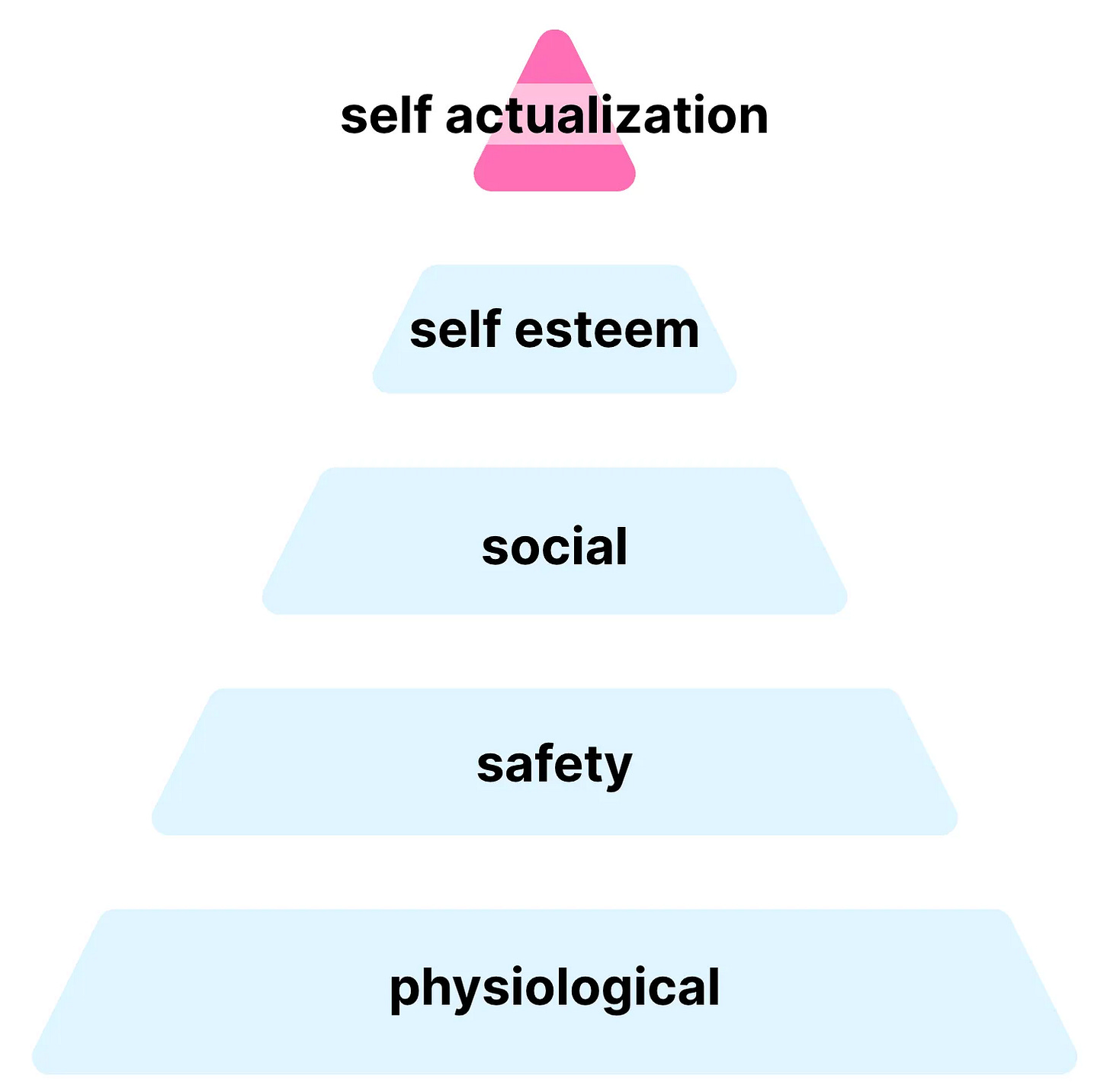the end of self improvement and start of something new
Why chasing your 'best self' might be making things worse.
Self improvement has had a big hype in recent years.
Tony Robbins sold 2 million copies with his book “Awaken the Giant Within” alone. Ali Abdaal has 500 million clicks on his youtube channel. 5.4 million listeners subscribed to the podcast Huberman Labs. Just to drop a few numbers on the sheer scale of the whole industry being created around the topic.
To some extent, that’s a good thing. Self improvement has given people a nudge to change their life for a better and provided toolkits on how they can achieve that.
But it’s getting out of control. Self improvement is no longer a means to an end, but the end itself. Crazy morning routines, over-complicated goalsetting frameworks, ‘life-changing’ hacks.
The system is wicked and puts millions of people on a treadmill of a never-ending hunt for being ‘better’.
We’ll deconstruct what’s going wrong to then paint a picture of a more holistic approach – self actualization.
here’s what’s wrong with self improvement
01 self improvement fosters a deficit-focus
As you go through life, you constantly think about how you can be more productive, do more sports, or be a better husband/ father/ son/ friend (and conversely the female versions of this).
By focusing on a desirable state in the future (a fit body, big income, you name it), you focus on what you don’t have so far. You will only see what you are missing, otherwise you’d already be there.
This is touching on one’s insecurities, implying something needs to be “fixed”.
Looking at what you don’t have underestimates how far you’ve come. The person you already are, all the challenges and hardships of the past you have mastered.
Self improvement suggests that you are not enough. I don’t know you, but I’m pretty sure you are enough as you are.
02 self improvement does not equal actual change
I started diving into the self improvement bubble when I was 17, eight years ago. Since then, I consumed countless pieces of content on the topic, may it be books, podcasts, youtube videos or whatsoever.
Though educating yourself is undoubtedly a smart thing to do, there is a diminishing marginal return of such content.
Consuming self improvement information creates the illusion of you working on yourself. But actually you are not, you’re just brainlessly watching a YouTube video.
To unleash real change, we have to get out of this consumption spiral and start creating something.
Standing in the arena is where you actually learn. Not sitting in the spectator ranks.
03 self improvement turns life into a project and you into a product
Self improvement culture often treats the self like a startup: optimize your morning routine, A/B test your habits, track every metric. While these tools can be useful, they can also strip life of its messiness, spontaneity, and joy. You start viewing yourself as something to fix, upgrade, or constantly iterate on – rather than someone to be lived with, understood, and occasionally forgiven.
This attitude will skyrocket self-criticism and perfectionism. Instead of being a human navigating the chaos we call life, you become a productivity machine trying to “maximize output.” Growth becomes performative. And ironically, in the pursuit of becoming your “best self,” you might lose touch with your actual self.
a new understanding of growth: self actualization
Now, to argue why self actualization is the better concept to focus on, I need to give a super brief overview on the psychological framework it stems from: Maslow’s hierarchy of needs. Bear with me.
Physiological needs (base of the pyramid) – These are survival needs – food, water, shelter, sleep, air. Without these, nothing else really matters.
Safety needs – Once basic survival is secured, we seek stability: physical safety, financial security, health, and protection from harm. This includes having a job, a safe home, and predictable routines.
Love and belonging – Humans are social creatures. We crave connection – family, friendships, intimacy, community. Belonging isn’t optional; it’s vital for mental and emotional health.
Esteem – After we feel connected, we want to feel valuable to ourselves and others.
This includes self-respect, confidence, achievement, and recognition. There’s an inner layer (self-esteem) and an outer layer (respect from others).
Self actualization (top of the pyramid) – This is the need to become who you truly are – to realize your full potential, creativity, and purpose.
It’s not about status or comparison, but alignment: Am I living a life that feels true to me?
why self actualization is the real deal
This concept is much more holistic. It’s not just about ‘improving’ some specific areas of your life, it’s about living authentically.
The idea of fulfilling our potential does not force us to unstoppably reach for the next better version in some area of our life. It says it’s okay to work with what you have in the moment.
Also, there is a reason for it being depicted on the top of Maslow’s pyramid: people must satisfy lower-level basic needs before progressing to higher-level growth needs.
You can’t dive into actualizing yourself without food on the table, a stable social environment and appreciation for who you are. Skipping steps might just as well lead to developing pathological behaviors.
This means, before you work on improving (better actualizing) yourself, get your foundations straight. Build a stable group of friends, call you grandmother, work hard for the job you want. Then, realize how far you’ve come already and start building a self that makes the best out of what it has.






